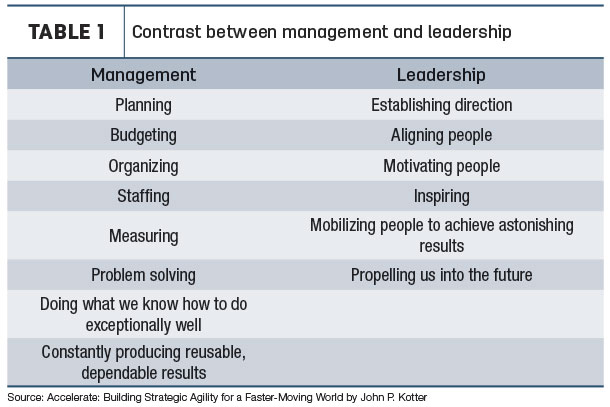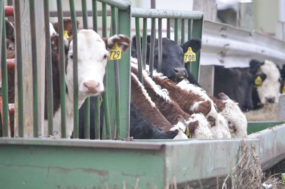In this article, I suggest leadership, team building, supervision and interpersonal relationships that will be increasingly important to your personal and beef production business success. You must increase your understanding of and skills in each. Suggestions are provided.
Leadership
A look back is needed to help us understand the increasing importance of leadership. When I grew up on our Thumb of Michigan farm in the middle of the 20th century, the biggest determinant of farm success was plain old hard work. As farms grew and agriculture became more complex, the importance of managing animals and crops – operational management – was added to hard work.
In recent years, two trends have added leadership to hard work and management. The first is the increasing importance of external forces, meaning that successful operational management is no longer enough to ensure success. The second is the increasing size of the workforce.
What, then, is this thing called leadership? Marcus Buckingham defines leadership as “Great leaders rally people to a better future.” Table 1 from Accelerate: Building Strategic Agility for a Faster-Moving World by John P. Kotter contrasts management and leadership.

The two lists are best summarized as:
- Managers decide
- Leaders rally
Note: The leadership function is more focused on the future, on people – partners, employees – and on interpersonal relationships/feelings.
Suggestions to improve your understanding of and capacity for leadership:
-
The Five Levels of Leadership by John Maxwell
-
Discover Your TRUE NORTH: Becoming an Authentic Leader by Bill George
- Servant Leadership: How You Can Achieve Great Relationships and Results edited by Ken Blanchard and Renee Broadwell
Team building
Today, many ranch and farm businesses have multiple families in leadership positions. A partnership is led by a team. The skilled sole proprietor owners typically have little or no experience in leading a team, and the new partners often have little or no leadership experience. This can be a recipe for disaster. Leadership and team building are required.
Since the owners of a partnership are a team, they need to make team decisions. This requires making the team a priority and some structure. Think about what would happen to your animal feeding performance or to your planting or harvesting timing if you had no structure. A team is no different; without some structure, success is unlikely. I believe that in almost all cases this structure involves regularly scheduled and effectively led meetings.
Team success is more than just having structure. It starts with a common vision for the future of the business. The following crucial team requirements are from the Lencioni reading listed below:
- Partners trust one another.
- The partner team engages in unfiltered conflict around ideas.
- Partners commit to decisions and plans of action.
- Partners hold one another accountable for delivering against those plans.
- Partners focus on the achievement of collective results.
Suggestions to improve your understanding of and capacity for building teams:
-
Making Vision Stick by Andy Stanley
-
The Secret of Teams: What Great Teams Know and Do by Mark Miller
- The Advantage: Why Organizational Health Trumps Everything Else in Business by Patrick Lencioni
Supervision
The current and future business environment necessitates an increase in the quality of supervision. Employee motivation research is increasingly supportive of the idea that employees are more productive, engaged and fulfilled when their psychological needs for choice, connection and competence are fulfilled. Choice (also called autonomy) requires that you perceive you have choices. Connection (also called relatedness) requires that you feel a sense of belonging and genuine connection to others. Competence requires that you demonstrate increasing skill over time.
The following are suggestions for enhancing your ability to provide choice, connection and competence in your workplace:
-
The Truth About Employee Engagement: A Fable About Addressing the Three Root Causes of Job Misery by Patrick Lencioni
-
Why Motivating People Doesn’t Work … and What Does by Susan Fowler
-
Master Your Motivation: Three Scientific Truths for Achieving Your Goals by Susan Fowler
- “Success for Supervisors:” A program I have developed with four 15- to 20-minute videos and a workbook. For more information, contact Robert Milligan or (651) 647-0495.
Interpersonal relationships
Think for a moment what your life would be like without interpersonal relationships – no one to interact with, talk to or even email or text. Life really is about relationships.
All relationships have one characteristic in common: trust. Think about relationships that have deteriorated. What happened? Almost always, the deterioration resulted from one or both parties violating the trust of the other person.
Enhancing our interpersonal relationships requires effort, usually including altering our behavior. The effective use of many communication tools including active listening, and asking questions is also required. Most importantly, developing relationships with partners, employees, family members, friends and trusted advisers must be a priority.
Suggestions to improve your interpersonal relationships include:
-
Everyone’s A Coach by Ken Blanchard and Don Shula
-
Seven Habits of Highly Effective People by Stephen Covey
-
How Full is Your Bucket: Positive Strategies for Work and Life by Tom Rath and Donald O. Clifton
- Start with WHY by Simon Sinek
A final thought
The future will be here before you know it. Will you have the knowledge and skills to succeed in the challenging and opportunity-filled future of beef production? Begin now to increase your commitment to learning. ![]()
Bob Milligan is also professor emeritus, Dyson School of Applied Economics and Management, Cornell University.

-
Bob Milligan
- Senior Consultant
- Dairy Strategies LLC
- Email Bob Milligan








